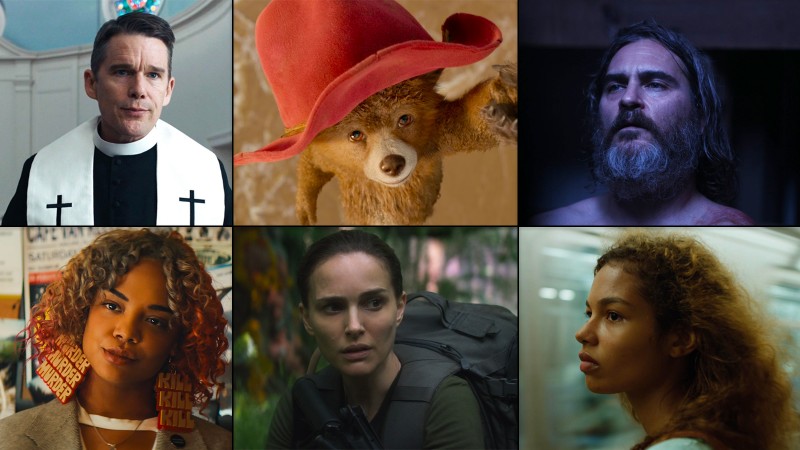1. Hereditary (Ari Aster)
I can’t recall too many films that deal with grief and guilt in such a devastating way. It’s unbearable watching Toni Collette (who is just extraordinary) wrestle her trauma and almost equally so watching the corrosive effect on the other family members. A sense of imminent destruction pervades every moment of the story. Gets even better on repeat viewings, notwithstanding the slightly goofy ending.
2. Shoplifters (Hirokazu Koreeda)
An abused child (seemingly from a well-to-do family) is ‘adopted’ by a poor family and is inducted into their life of petty crime. What shapes up as a manipulative Spielbergian tearjerker becomes so much more than that. The ‘family’ members are tied together in strange, almost parasitic ways; the true nature of their relationships are revealed only gradually and obliquely. It takes genuine sensitivity to tell a story like this and Koreeda has complete mastery of his material. It resists obvious moralising and demands a lot of the viewer, as it should.
3. First Reformed (Paul Schrader)
The comparisons to Taxi Driver are obvious, but in some ways Schrader is even more shrewd here in using a likeable, kindly priest to explore alienation rather than someone who is already an outsider like Travis Bickle. And whereas Taxi Driver really focuses on Bickle’s disillusionment and anger, First Reformed balances things by honing in on Father Ernst’s own sense of guilt, hypocrisy, complacency and self-loathing. Although the Hippocratic Oath doesn’t apply to priests, Schrader seems to be asking us to question the wisdom of “First, do no harm”. Aren’t we doing harm by doing nothing?
4. Under the Silver Lake (David Robert Mitchell)
As previously posted: Starts out as a languid noir in the vein of The Long Goodbye and Chinatown, rapidly becomes a Pynchon-esque urban Alice in Wonderland. Inherently silly but daring, outlandish and funny enough to get away with it. From the director of It Follows.
5. Upgrade (Leigh Whannell)
Tech-noir thriller which adeptly balances serious sci-fi concepts with stylish hyper-violence. Just damn good fun.
6. The Favourite (Yorgos Lanthimos)
Razor sharp satire on power and manipulation which plays out as one part Oscar Wilde, one part All About Eve, and one part Blackadder. Standout performances from the 3 female leads.
7. The House That Jack Built (Lars Von Trier)
I’m not sure if the idea for this film was hatched prior to Lars Von Trier being implicated in ‘metoo’ type scandals, but either way it’s difficult to see this film as anything but Von Trier’s violent, offensive and very funny middle-finger riposte to censorship and political correctness. It still has the pretentiousness and obviousness that I don’t like about Von Trier (particularly towards the end), but its strengths are hard to deny. Matt Dillon is brilliantly sleazy.
8. Den Skyldige (The Guilty) (Gustav Moller)
A cop working in a call centre receives an emergency call from an abducted woman and has to track her down. I’m a sucker for thrillers that play like ‘theatre’, ie taking place in a single location where we have to piece together what is happening off-screen. It forces the director to make the most of the limited tools at their disposal. This is a taut, clever example of the style.
9. Strange Colours (Alena Lodkina)
Technically a 2017 release, but not screened in my town until 2018 so I’m counting it. This beautiful, minimalistic and sparse story takes place in a remote Australian opal mining town populated by reclusive souls, as a teenage girl tries to reconnect with her gruff, estranged, terminally ill father. Or perhaps it’s the other way round. Imagine if Wake in Fright was directed by Wim Wenders.
10. Suspiria (Luca Guadagnino)
A successful reimagining of Argento’s classic. The success comes from the way it subverts our expectations from the original and introduces new perspectives. Firstly there’s the maternal relationship between Susie and Madame Blanc; to some extent it’s there in the original but doesn’t really go anywhere. Secondly, whilst the original film is about witches who just happen to run a dance school, Guadagnino develops the linkages between the two: the allure of the occult becomes a metaphor for the desire for power and success, and for the vices that plague successful artists and sportspeople. Appropriately, then, dance plays a much more central role (in fact all the best scenes incorporate it). Visually it’s very striking too, without imitating Argento. But the attempts to place the story in a socio-political context largely fail, and at times it does feel bloated and meandering as a result.
11. Todos lo saben (Everybody Knows) (Asghar Farhadi)
12. The Ballad of Buster Scruggs (Coen Bros)
13. Zimna Wojna (Cold War) (Pawel Pawlikowski)
14. Roma (Alfonso Cuaron)
15. Free Solo (Jimmy Chin and Elizabeth Vasarhelyi)
16. Mission Impossible – Fallout (Christopher McQuarrie)
17. Annihilation (Alex Garland)
18. Can You Ever Forgive Me? (Marielle Heller)
19. Climax (Gaspar Noe)
20. They Shall Not Grow Old (Peter Jackson)


